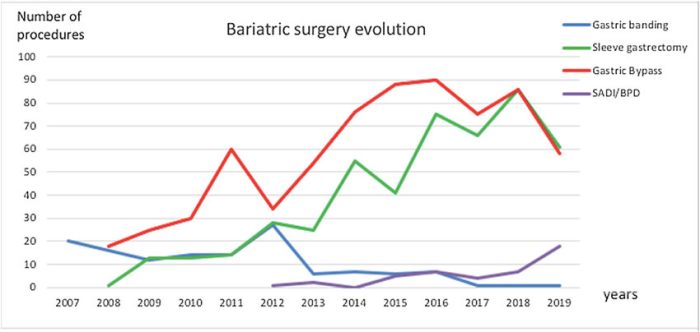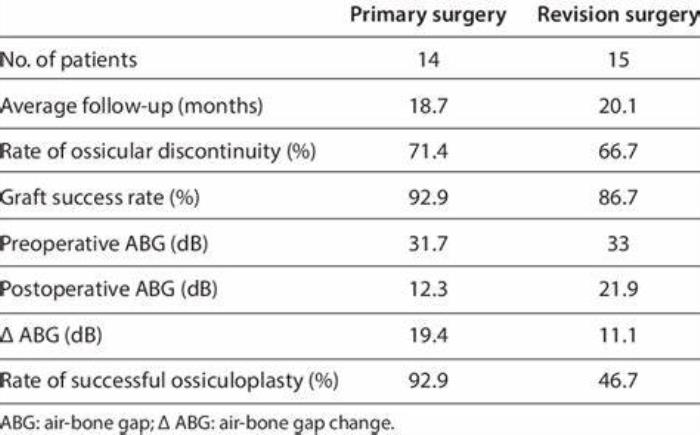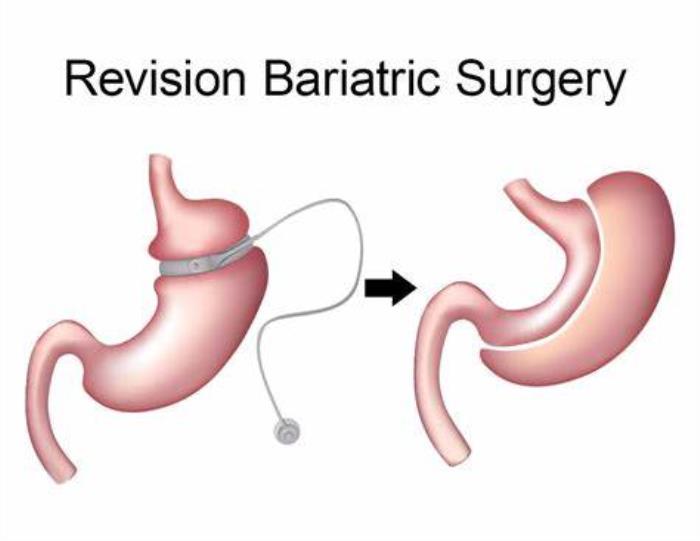Revision bariatric surgery is a procedure performed on patients who have previously undergone weight-loss surgery but have experienced complications or unsatisfactory results. This surgical option offers an opportunity to correct issues such as insufficient weight loss, weight regain, or surgical complications from the original procedure. As bariatric surgery continues to evolve, the need for revision procedures has increased to ensure patients maintain their desired weight-loss outcomes and overall health improvements.
Medical disclaimer: This content is for general awareness and does not replace a doctor’s consultation. For diagnosis or treatment decisions, consult a qualified specialist.
Revision bariatric surgery requires careful planning and individualized assessments to determine the best approach for each patient. Factors such as the type of original surgery, the patient’s current health, and the specific reason for revision must be considered.
What Is Revision Bariatric Surgery?
Revision bariatric surgery refers to any surgical procedure performed after an initial bariatric surgery, aimed at correcting, adjusting, or enhancing the results of the first operation. The procedure may involve modifying the original surgery, such as adjusting a gastric band, converting a sleeve gastrectomy to a gastric bypass, or repairing anatomical issues. Each revision surgery is customized to the patient's specific needs and underlying issues, ensuring better weight loss management and improved health outcomes.

The goals of revision bariatric surgery can vary depending on the patient's situation. It might be necessary due to complications like strictures, leaks, or poor absorption, or it could be pursued to address suboptimal weight loss or weight regain. Regardless of the reason, revision surgery is typically more complex than the original procedure, as it requires addressing scar tissue and potential complications from the first surgery. However, it offers a critical opportunity for patients to regain control over their weight and health.
Common Reasons for Revision Bariatric Surgery
Patients may seek revision bariatric surgery for several reasons, including insufficient weight loss, weight regain, or complications related to the original surgery. In some cases, the initial bariatric procedure may not result in the expected level of weight loss, or patients may experience issues such as nutritional deficiencies or gastrointestinal problems. Additionally, over time, some patients regain a significant amount of weight due to stretching of the stomach pouch or changes in metabolism, prompting the need for a revision procedure.
Complications like gastric band slippage, erosion, or fistula formation are other common reasons for revision surgery. In these cases, revision surgery not only addresses the complication but also offers an opportunity to switch to a different type of bariatric surgery that may be more effective for the patient. Whatever the cause, a thorough evaluation by a bariatric surgeon is essential to determine the best course of action and ensure the success of the revision procedure.
The Evolution of Bariatric Procedures: Why Revisions Are Needed
Bariatric surgery has significantly evolved over the past few decades, leading to more refined techniques and improved patient outcomes. However, as procedures have changed, the need for revision surgeries has also grown. Early bariatric procedures, such as adjustable gastric banding, have fallen out of favor due to complications and less effective long-term weight loss results. Patients who underwent these earlier procedures may require revisions to switch to more modern techniques like gastric bypass or sleeve gastrectomy, which provide more consistent outcomes.

Advances in technology and surgical expertise have made revision bariatric surgery safer and more effective. Surgeons are now better equipped to manage complications or make adjustments to previous surgeries with minimally invasive techniques. However, as newer methods are introduced, it is important for patients to stay informed about the risks and benefits of revision surgery, as well as the potential for improved long-term health and weight management.
Understanding the Latest Research on Bariatric Revision Outcomes
Recent research on bariatric revision surgery outcomes has provided valuable insights into the success and challenges of these procedures. Studies indicate that while revision surgery can result in significant weight loss and health improvements, the results are often less dramatic compared to primary bariatric surgery. This is partly due to the complexity of revision procedures and the presence of scar tissue from previous surgeries. However, many patients still benefit from improved weight control, reduced comorbidities, and a better quality of life following revision surgery.
The success of bariatric revision surgery largely depends on the reason for the revision, the type of procedure being revised, and the patient’s commitment to lifestyle changes. Recent advancements in surgical techniques, such as minimally invasive laparoscopic revisions, have also improved recovery times and reduced the risk of complications. Ongoing research continues to focus on optimizing revision outcomes, ensuring that patients achieve long-term success in their weight-loss journey.
Comparing Success Rates of Primary vs Revision Surgery
Primary bariatric surgery, such as gastric bypass or sleeve gastrectomy, generally yields higher success rates than revision surgery due to the complexity of the latter. Revision surgeries are often performed to address complications or insufficient weight loss from the initial procedure, and outcomes can be more variable. However, advances in surgical techniques have improved the success rates of revisions, although patients undergoing revision surgeries may experience slightly slower weight loss and a higher risk of complications compared to first-time procedures.

Revising Gastric Bypass Surgery: Challenges and Solutions
Revising gastric bypass surgery presents unique challenges due to the anatomical changes made during the initial procedure. Surgeons must navigate scar tissue and altered digestive pathways, which can complicate revision efforts. Common reasons for revision include inadequate weight loss, weight regain, or complications like strictures. Solutions range from resizing the stomach pouch to altering the intestinal limb. Endoscopic procedures are increasingly being used as a less invasive alternative to traditional surgery, offering promising results with reduced recovery times.
Revision Sleeve Gastrectomy: Recent Advances
Recent advances in revision sleeve gastrectomy procedures have improved the safety and outcomes of this complex surgery. Patients may seek revision due to insufficient weight loss, acid reflux, or complications from the original surgery. New techniques, such as re-sleeving or converting the sleeve to a different bariatric procedure like a gastric bypass, offer patients additional options for achieving their weight loss goals. Enhanced laparoscopic tools and minimally invasive techniques have contributed to faster recoveries and reduced risks in revision sleeve gastrectomy.
Converting Lap-Band to Other Procedures: What Research Shows
Research has shown that converting Lap-Band to other bariatric procedures, such as gastric bypass or sleeve gastrectomy, can be highly effective for patients who experience insufficient weight loss or complications from the band. Lap-Band removal followed by conversion to a more effective procedure often results in improved weight loss outcomes and a significant reduction in comorbidities. However, conversion surgeries can be technically challenging due to scar tissue and potential complications from the initial Lap-Band procedure.

The Role of Endoscopic Techniques in Bariatric Revisions
Endoscopic techniques are playing an increasingly important role in bariatric revision surgeries. These minimally invasive methods allow for the treatment of issues such as weight regain or anatomical complications without the need for open surgery. Procedures like endoscopic sleeve gastroplasty or outlet reduction for gastric bypass patients offer less risk and quicker recovery compared to traditional surgical revisions. This makes endoscopy an attractive option for patients needing a less invasive revision approach.
How Weight Regain Impacts the Need for Revision Surgery
Weight regain after bariatric surgery is a common reason for seeking revision surgery. Factors contributing to weight regain include poor dietary habits, lack of exercise, or anatomical changes, such as the stretching of the stomach pouch. Revision surgery aims to restore the original procedure’s effectiveness, whether through re-sleeving, pouch resizing, or converting to another bariatric technique. Early intervention, lifestyle adjustments, and medical support are crucial in managing weight regain and determining whether surgery is necessary.
Exploring the Latest Surgical Techniques in Revision Procedures
The latest surgical techniques in bariatric revision procedures emphasize minimally invasive methods that reduce recovery times and minimize complications. Laparoscopic and robotic-assisted surgeries are increasingly used to improve precision during revision operations. Advanced suturing devices and endoscopic tools allow surgeons to perform complex revisions with more control, reducing the risk of leaks and other complications. These innovations have significantly improved patient outcomes and reduced the length of hospital stays.
Safety and Efficacy of Minimally Invasive Revision Bariatric Surgery
Minimally invasive revision bariatric surgery has proven to be both safe and effective for patients requiring a second procedure. Laparoscopic techniques have reduced the need for open surgeries, leading to fewer complications, less postoperative pain, and quicker recovery times. While revision surgeries carry inherent risks due to scar tissue and previous anatomical changes, minimally invasive methods have significantly lowered these risks, making revision surgery a viable option for more patients.
Risks and Complications Associated with Bariatric Revision
Bariatric revision surgery carries a higher risk of complications compared to primary bariatric procedures. Common risks include infection, leaks at surgical sites, blood clots, and malnutrition. Scar tissue from the first surgery can complicate the revision process, leading to longer operative times and an increased risk of injury to surrounding organs. However, with the use of minimally invasive techniques and thorough preoperative planning, many of these risks can be managed effectively.
Long-Term Outcomes After Revision Bariatric Surgery
Long-term outcomes after revision bariatric surgery can vary depending on the reason for revision and the procedure performed. Many patients experience improved weight loss and resolution of comorbidities, such as diabetes and hypertension, following revision surgery. However, the rate of weight loss may be slower compared to the primary surgery, and patients must remain committed to lifestyle changes for sustained success. Regular follow-up and monitoring are essential to achieving optimal long-term results after revision bariatric surgery.
Psychological Factors in Patients Seeking Revision Surgery
Psychological factors play a crucial role in patients seeking revision bariatric surgery. Many individuals may experience frustration, disappointment, or feelings of failure if their initial bariatric surgery did not yield the desired weight loss or led to complications. Emotional challenges such as depression, anxiety, or body image concerns can intensify the need for revision surgery. Preoperative counseling and mental health support are vital in ensuring that patients are emotionally prepared for the revision procedure and have realistic expectations about the outcomes.
The Impact of Revision Surgery on Comorbidities
Revision bariatric surgery can significantly impact comorbidities, especially for patients who did not experience sufficient improvement from the primary procedure. Conditions like type 2 diabetes, hypertension, and sleep apnea may see renewed improvement after a successful revision surgery. Studies have shown that addressing anatomical issues or enhancing the effectiveness of the initial surgery through revision can lead to a reduction in medication use and a better quality of life for patients, though results vary depending on the individual's health status and adherence to postoperative guidelines.
Recent Clinical Trials and Studies in Bariatric Revisions
Recent clinical trials and studies in bariatric revision surgery have focused on improving techniques, minimizing complications, and optimizing patient outcomes. Researchers are exploring the use of endoscopic procedures, robotic assistance, and advanced suturing technologies to enhance safety and efficacy in revision surgeries. Long-term studies are also investigating how revision surgeries impact weight loss maintenance and comorbidity resolution over time, with promising findings suggesting that minimally invasive revisions are both safe and effective for a wide range of patients.
Future Directions in Revision Bariatric Surgery Research
The future of revision bariatric surgery research is expected to focus on enhancing minimally invasive techniques, improving patient selection criteria, and personalizing surgical interventions. Advances in robotic-assisted surgery, artificial intelligence for surgical planning, and precision medicine are all areas of ongoing study. Additionally, research will continue to evaluate the long-term success of revision surgeries, including the prevention of weight regain and improved management of comorbidities. Researchers are also exploring the role of gut microbiota and metabolic changes in the effectiveness of bariatric revisions.
Exploring Alternatives to Revision Bariatric Surgery
Discover various alternatives to traditional revision bariatric surgery, including dietary modifications, lifestyle changes, and non-surgical procedures. These options can help individuals achieve their weight loss goals without undergoing additional surgery, offering a less invasive approach to weight management.
The Role of Physical Therapy in Bariatric Surgery Recovery
Learn about the crucial role of physical therapy in the recovery process following bariatric surgery. A tailored physical therapy program can enhance mobility, promote healing, and help patients develop the strength needed to maintain a healthier lifestyle after surgery.
Best Revision Bariatric Surgery in India
The Best Revision Bariatric Surgery in India helps patients who have not achieved the desired results from their initial weight loss surgery, offering advanced techniques to improve outcomes and ensure long-term success.
Best Revision Bariatric Hospitals in India
The Best Revision Bariatric Hospitals in India are equipped with modern technology and skilled teams, providing comprehensive care that includes pre-surgery assessments and post-surgical follow-up for optimal recovery.
Revision Bariatric Surgery Cost in India
The Revision Bariatric Surgery Cost in India is competitive and transparent, offering patients affordable treatment options while maintaining the highest standards of care and personalized attention at top hospitals.
Best Revision Bariatric Surgeons in India
The Best Revision Bariatric Surgeons in India have extensive experience in weight loss revision procedures, ensuring precise surgical techniques and individualized patient care to achieve the best possible outcomes.
FAQs About Revision Bariatric Surgery
What is revision bariatric surgery?
Revision bariatric surgery is a procedure performed on patients who have previously undergone bariatric surgery but experienced inadequate weight loss, weight regain, or complications. It involves altering or revising the initial surgery to improve outcomes.
Who is a candidate for revision surgery?
Patients who have not achieved their desired weight loss goals, developed complications, or experienced significant weight regain after their primary surgery may be candidates for revision surgery. A thorough evaluation by a bariatric surgeon is required to determine eligibility.
What are the risks of revision bariatric surgery?
Risks include infection, bleeding, leaks, blood clots, and injury to surrounding organs. Revision surgeries carry higher risks due to scar tissue from the first surgery, but advancements in minimally invasive techniques have reduced many of these risks.
How does revision surgery impact weight loss and comorbidities?
Revision surgery can help patients achieve further weight loss and improve or resolve comorbidities like type 2 diabetes, hypertension, and sleep apnea. However, weight loss may be slower compared to the initial procedure, and success depends on adherence to postoperative guidelines.
What recovery time can I expect after revision surgery?
Recovery times vary depending on the type of revision surgery performed, but patients can typically expect a slightly longer recovery period compared to their initial surgery. Minimally invasive techniques can shorten hospital stays and reduce recovery time.
Learn how to identify if revision bariatric surgery is necessary. Explore common signs like weight regain, complications, or inadequate results from the initial procedure, and discover the next steps. Signs You May Need Revision Bariatric Surgery
Explore the success rates of revision bariatric surgery. Learn about factors influencing outcomes, improvements in weight loss, and the resolution of complications from previous procedures. Understanding the Success Rates of Revision Bariatric Surgery
Learn about the potential risks and complications of revision bariatric surgery. Discover how factors like surgical complexity, healing challenges, and patient health can impact outcomes. Understanding the Risks of Revision Bariatric Surgery